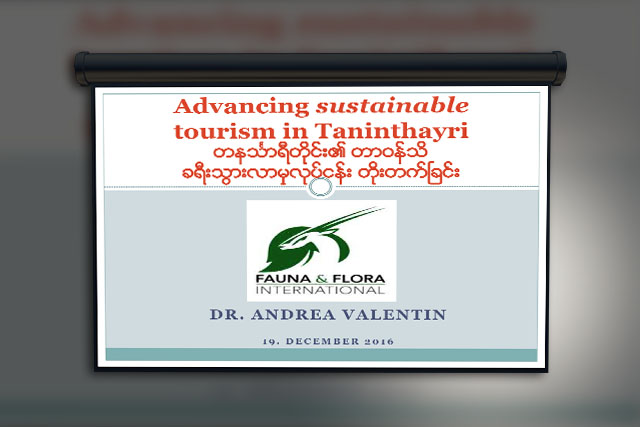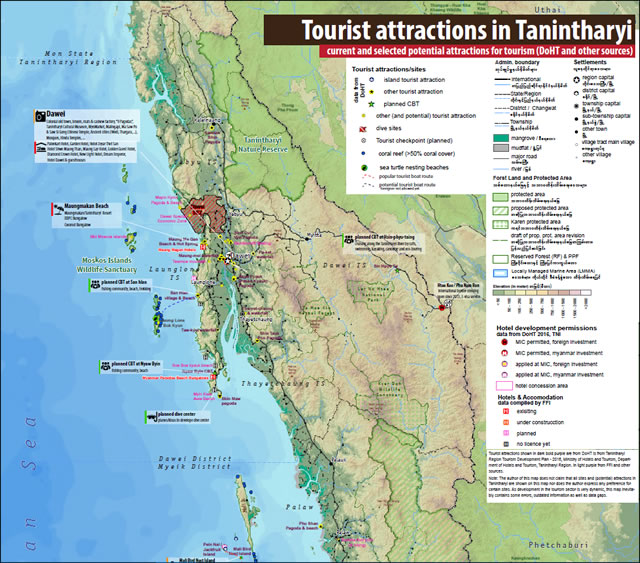MCRB and Flora & Fauna International co-Host Multi-Stakeholder Workshop on Sustainable Tourism in Tanintharyi Region

MCRB and FFI co-hosted a two-day multistakeholder workshop on sustainable and responsible tourism in Tanintharyi, over two days in Dawei on 19 and 20 December.
Around 120 participants attended from government, business, civil society. Tanintharyi Region Tourism Minister U Myint Maung gave a keynote address on behalf of the Chief Minister Dr Lei Lei Maw who sent her regrets due to an international trip.
The workshop heard from international experts from WWF Galapagos who spoke about biodiversity conservation through tourism in the Galapagos Islands. FFI have established an exchange program with the Galapagos World Heritage Site to share lesson learned from global best practice in responsible tourism in protected areas and sustainable financing mechanisms for protected area management.
Fauna & Flora International (FFI) conducted a baseline assessment of sustainable tourism development in Tanintharyi in 2016, with the outcome of a proposed strategy that directly addresses the perceived challenges. Meanwhile, the Myanmar Forest Department (FD), ICIMOD, Oikos, and FFI have undertaken studies to develop eco-tourism strategies for protected areas in Myanmar and piloted community-based in eco-tourism in Indawgyi Widlife Sanctuary (FFI) and Lampi National Park (Oikos).
MCRB conducted a sector-wide impact assessment on tourism in 2014 (published Feb 2015) with a focus on social and human rights impacts. To follow up on these assessments, stakeholder consultations, and lessons from best practices for responsible tourism in protected areas, MCRB, FFI and WWF Galapagos in collaboration with the Tanintharyi Regional Government organised this multi-stakeholder workshop in one Myanmar’s most important emerging tourist destinations, to facilitate local stakeholders to discuss priorities and challenges facing the development of tourism. The particular emphasis is on minimizing the negative impacts to the outstanding natural resources of Tanintharyi’s coastal area, including its extensive lowland rainforests and Myeik archipelago.
This workshop in Dawei is the first multi-stakeholder workshop on responsible tourism in Tanintharyi. Its objectives are to:
-
Establish a multi-stakeholder dialogue on priority issues related to responsible tourism in Tanintharyi, with focus on planning and consultation with communities, land issues, community benefits, tourism zoning, licensing for SME development, and environmental and biodiversity impacts.
-
Share lessons learned from global best practice in tourism in protected areas (Galapagos WHS) and community-based tourism initiatives in Myanmar (Indawgyi WS, Lampi NP) as well as lessons learned from other coastal destinations in Myanmar (Ngapali, Chaungtha, Ngwesaung).
-
Identify follow up actions that support sustainable destination management.
Presentations are available below, together with maps prepared for the workshop of tourism investments, attractions and sensitive environmental areas in Tanintharyi Region. The workshop report will be uploaded shortly.
Read also
- Tourism Sector
- New Report and Upcoming Webinar on Human Rights in Tourism
- White Paper on Tourism in Myanmar
- Planning for a Brighter Future in Mrauk U: Cultural Heritage and Tourism Management
- 4th National Conference on Communities and Tourism 2019
 English
English မြန်မာ
မြန်မာ မြန်မာ (unicode)
မြန်မာ (unicode)













